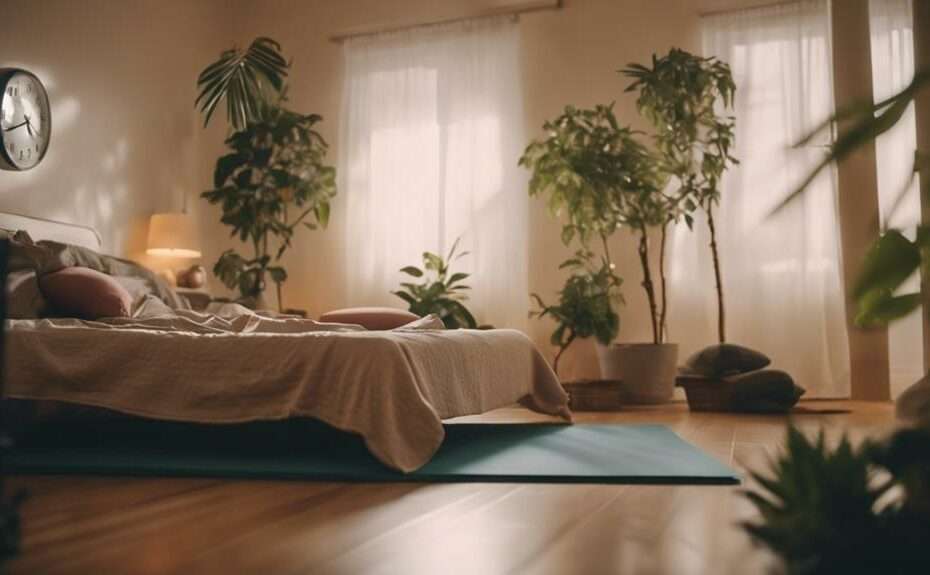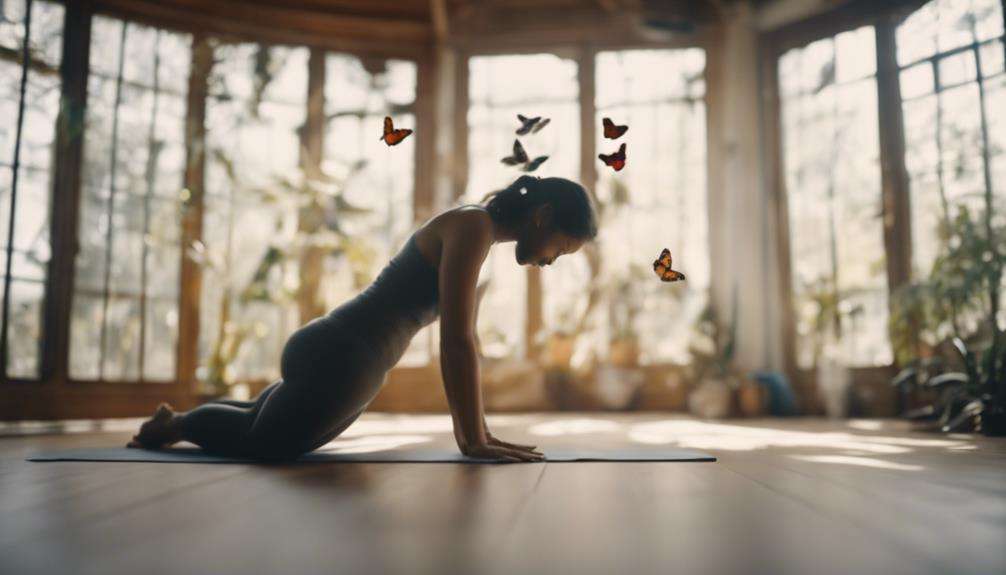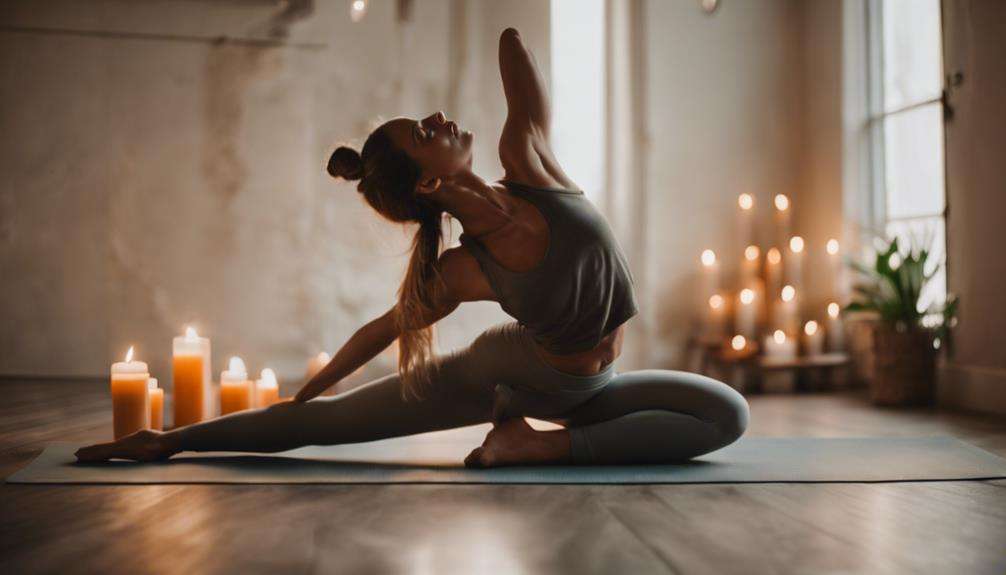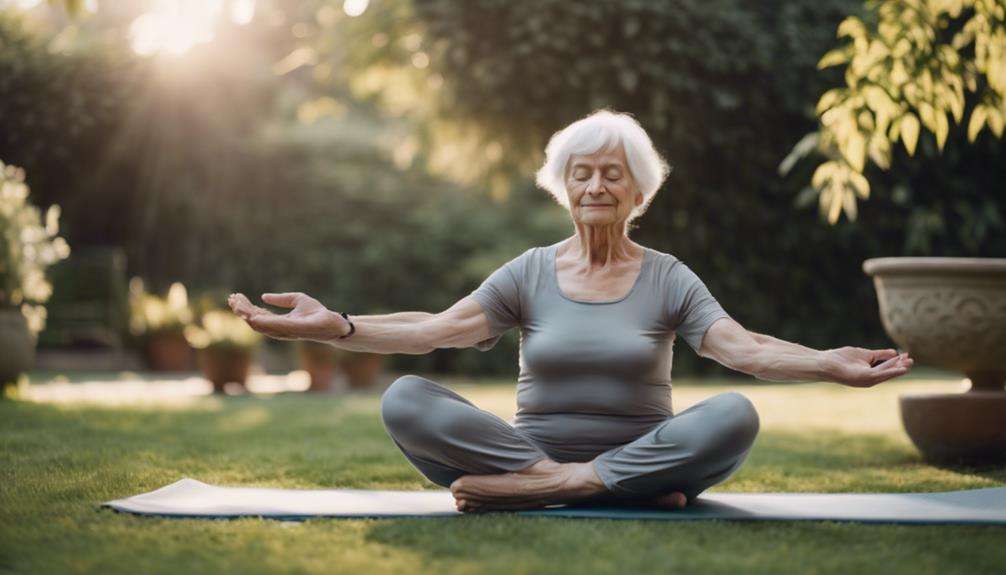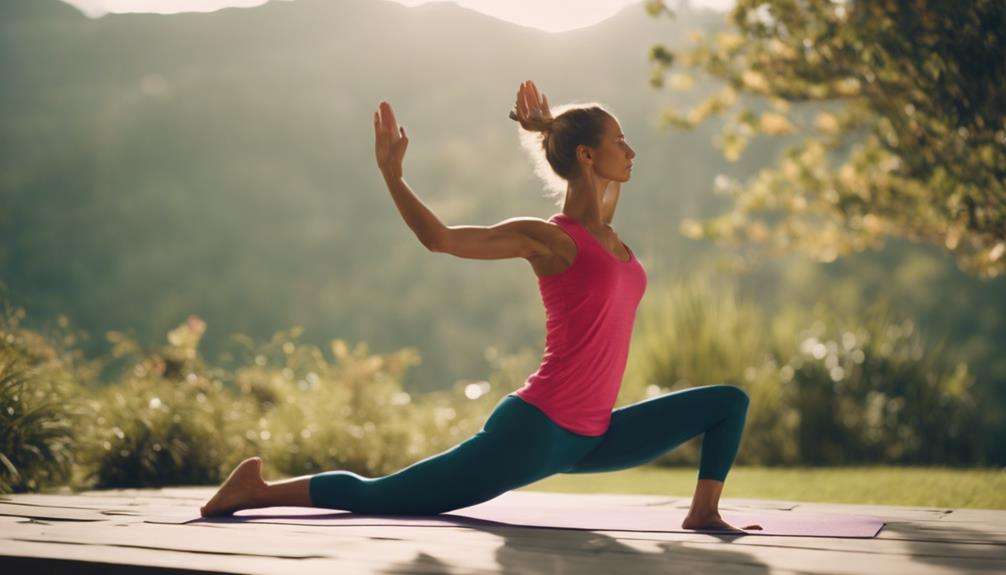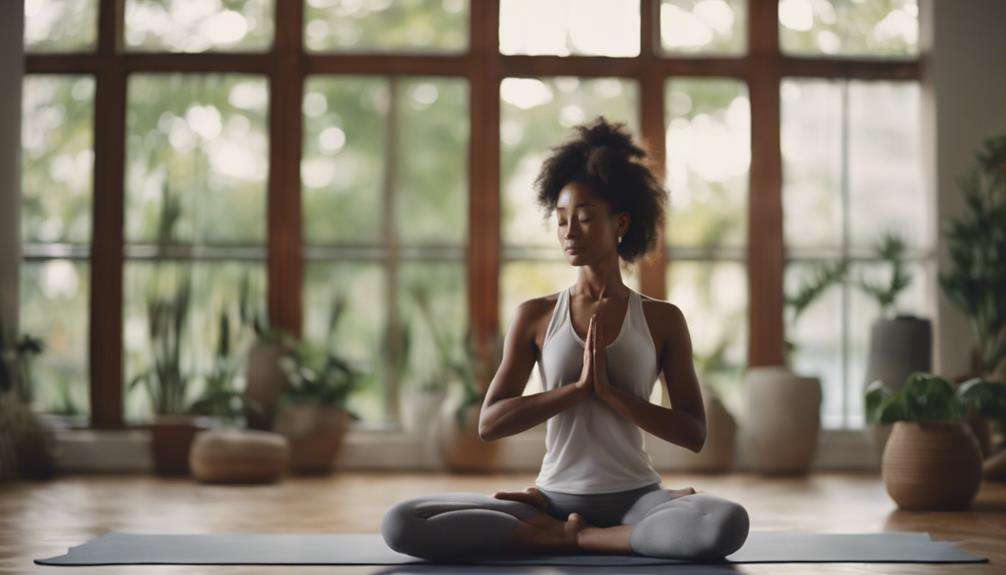Imagine your mind as a tangled ball of yarn, each thought tightening the knots that keep you from unravelling into a peaceful slumber.
But what if there were ways to gently loosen those knots, allowing your mind to unwind and your body to relax, paving the way for a restful night's sleep?
Discover how the fusion of flexibility and mindfulness practices can untangle the complexities of your mind and body, offering you the key to unlocking deeper, more rejuvenating sleep cycles.
Key Takeaways
- Enhanced sleep quality through reduced muscle tension and improved circulation
- Calm mind and relaxed body facilitate better sleep quality
- Preparation for restful sleep with mindfulness practices and yoga poses
- Rejuvenating and restorative sleep achieved through flexibility and mindfulness practices
Benefits of Yoga and Meditation
If you're looking to enhance your sleep quality, incorporating yoga and meditation into your routine can be a powerful and effective way to achieve better rest. Mindfulness practices such as yoga and meditation have been shown to significantly improve sleep quality. Studies indicate that these practices have a more profound impact on enhancing sleep compared to other relaxation techniques.
Engaging in mindful movement activities like yoga and gentle stretching before bedtime can effectively relax both your body and mind, setting the stage for a more peaceful sleep. By integrating yoga, tai chi, or mindful walking into your bedtime rituals, you can calm your mind, release tension, and create an environment conducive to restful sleep.
Additionally, guided meditations and bedtime yoga routines are valuable tools for preparing your body and mind for a night of peaceful sleep. These practices can help you unwind, let go of the stresses of the day, and enter a state of relaxation that promotes better sleep quality. Incorporating these mindfulness techniques into your nightly routine can lead to a more rejuvenating and restorative sleep experience.
Flexibility for Better Sleep
Incorporating flexibility exercises, such as yoga and stretching, into your bedtime routine can significantly relax your body and contribute to better sleep quality. Here's how flexibility practices can help enhance your sleep:
- Reduced Muscle Tension: Flexibility exercises work to release built-up tension in your muscles, allowing for a more relaxed state before bedtime.
- Improved Circulation: By engaging in flexibility exercises, you can enhance blood flow throughout your body, promoting relaxation and peaceful sleep.
- Enhanced Relaxation: Flexibility practices help calm your mind and body, creating a conducive environment for restorative sleep.
- Better Sleep Quality: Regularly incorporating flexibility into your routine has been linked to overall improvements in sleep duration and quality, leading to a more rejuvenating night's rest.
Mindful Movement Practices

To further enhance your sleep quality, consider exploring the benefits of mindful movement practices like yoga and tai chi, which can effectively calm your mind and relax your body. Engaging in these practices as part of your bedtime routine can help release tension and stress accumulated throughout the day, promoting a smoother transition into sleep.
Incorporating guided meditations and body scan techniques during these mindful movements can prepare your body and mind for a restful night's sleep. Research indicates that these practices aren't only relaxing but also aid in reducing anxiety, ultimately improving overall sleep quality as measured by the Pittsburgh Sleep Quality Index.
Yoga Poses for Relaxation
For enhanced relaxation and improved sleep quality, certain yoga poses such as Child's Pose and Legs-Up-the-Wall are particularly beneficial. Here are some key yoga poses that can help you relax and prepare your body for a restful night's sleep:
- Child's Pose: This gentle stretch helps release tension in the back, shoulders, and chest, promoting relaxation before bedtime.
- Legs-Up-the-Wall: By elevating your legs, this pose can calm the nervous system, reduce stress, and enhance blood circulation, aiding in better sleep quality.
- Forward Fold or Corpse Pose: Holding these poses can induce a state of deep relaxation, quieting the mind and preparing your body for sleep.
- Cat-Cow or Supine Twist: These poses help release physical and mental tension, promoting a peaceful transition to sleep by reducing overall stress levels.
Incorporating these gentle yoga stretches into your bedtime routine can't only improve sleep quality but also support flexibility, reduce anxiety, and contribute to overall sleep wellness. Give these poses a try to calm your nervous system, release tension, and enhance your sleep experience.
Meditation Techniques for Sleep
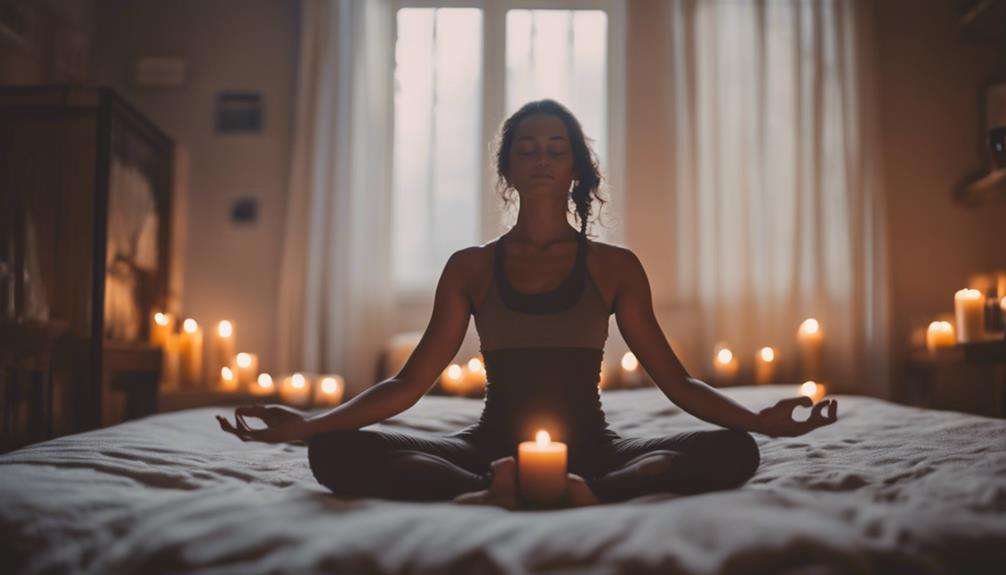
Enhance your sleep quality by exploring meditation techniques tailored to promote relaxation and reduce stress before bedtime. Mindfulness meditation, which involves focusing on the present moment without judgment, is a powerful tool for calming the mind and preparing the body for sleep. Body scan meditation is another effective technique where you systematically bring awareness to different body parts, releasing tension and promoting relaxation to improve sleep quality.
Guided sleep meditation combines mindfulness exercises and visualizations to create a serene mental space ideal for falling asleep peacefully. If you prefer more active practices, mindful movement activities like yoga or tai chi can help release physical tension, relax the body, and prepare you for a restful night's sleep.
Additionally, practicing mindful eating by savoring food flavors and being fully present during meals can aid digestion and prevent disturbances that might affect your sleep. By incorporating these meditation techniques into your bedtime routine, you can cultivate a sense of relaxation, reduce stress, and ultimately improve your sleep quality and overall flexibility.
Frequently Asked Questions
How Does Mindfulness Improve Sleep Quality?
Mindfulness improves sleep quality by promoting deep relaxation, strengthening the mind-body connection, reducing stress, enhancing sleep hygiene, practicing mindful breathing, regulating sleep patterns, increasing body awareness, optimizing cognitive function, establishing a bedtime routine, and ensuring adequate sleep duration.
How Do I Practice Mindfulness to Sleep?
To practice mindfulness for better sleep, start with deep breathing exercises. Incorporate mindfulness techniques into your sleep routine, like body scans and guided meditation. Establish bedtime rituals that promote relaxation, reduce stress, and enhance your mind-body connection.
Is Improved Flexibility a Benefit of Mindfulness?
Improving flexibility through mindfulness involves a deep mind-body connection. Mindful movements like yoga enhance body awareness and promote flexibility. As you practice mindfulness, notice how stretching benefits your physical well-being. Engage in flexibility training with mindful stretching for optimal results.
Can Mindfulness Meditation Replace Sleep?
Mindfulness benefits sleep quality by enhancing relaxation and reducing stress. However, mindfulness meditation cannot replace sleep. Sleep is crucial for physical and mental restoration. Both are essential for overall health. Practice mindfulness to improve sleep, not substitute it.
Conclusion
Incorporating flexibility and mindfulness practices into your bedtime routine can lead to improved sleep quality. By practicing yoga, meditation, and mindful movement, you can calm your mind, release tension in your body, and create a peaceful environment for restful sleep.
So, why not give yourself the gift of better sleep tonight by embracing these techniques and taking care of your mind and body? Your future self will thank you for it.
